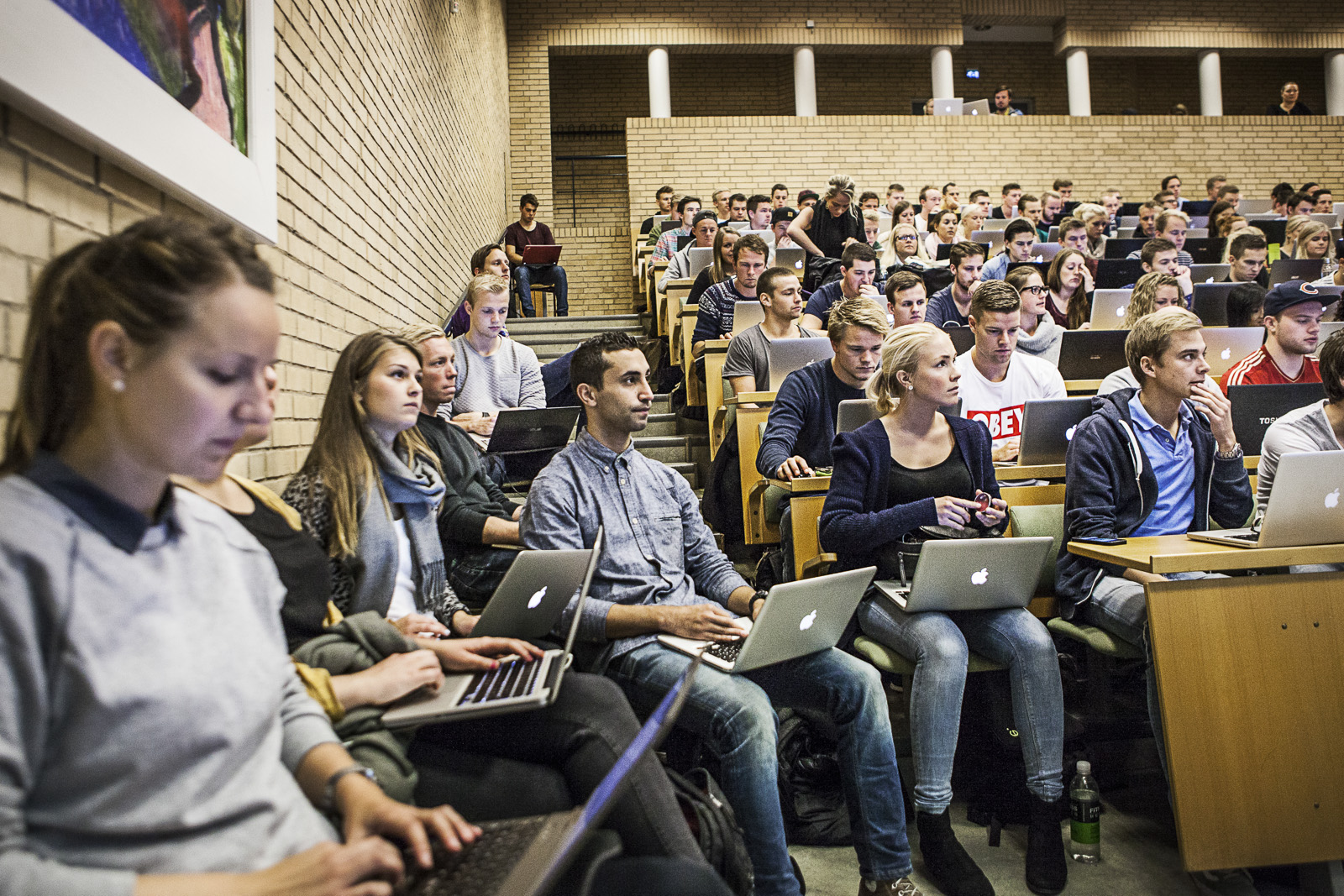Lectures: students are shopping around
Like sardines in a tin. Students sitting on the windowsills and staircases – it’s quite a common sight at BSS. The reason for the shortage of space is that students are shopping around to find the lectures that suit them best. For instance, lectures on Friday afternoons are very unpopular.


The Thursday lecture on financial management is obviously hugely popular among students of economics at Fuglesangs Allé in Aarhus. The 140 seats in the room fill up quickly, even though the timetable says that only 113 students are supposed to be here. Extra tables and 10-20 chairs are carried in, and some students have to sit on the staircases. There’s only a single vacant chair, and it’s right in front of the lecturer.
Lecture theatres that are bursting at the seams are a common sight at the Fuglesangs Allé campus. The huge size of some of the classes at BSS means that the same lecture often has to be given more than once. So if you can’t make it one day, you can simply come along next time.
But this kind of flexibility is being exploited, and it’s starting to cause problems. A quick glance at the timetable gives a pretty good idea of why the Thursday lecture is so popular. Some of the students are supposed to be having the same lecture at the slightly less popular time of 4-6 pm on Friday afternoon.
It’s pretty common
According to Joachim Krogstrup Mikkelsen (a student of business economics and chair of the Academic Business Council at BSS) and Morten Svendsen (an MSc student of business administration and a member of both the Academic Business Council and the board of studies for the business administration programme), the main reason for the crowded lecture theatres is that students are shopping around.
“They choose the times of the day and the lecturers that suit them best,” they explain.
“We often get complaints from students who can’t find anywhere to sit even though the lecture in question is on their timetable,” says Mikkelsen, adding that:
“It’s difficult to take notes when you’re sitting on a staircase with your computer on your knees. It’s uncomfortable, and in some lecture theatres there are pillars in front of you so you can’t see the board or overhead screen.”
Overbooking
The two students also say that sometimes lectures are held in rooms that are too small even for the number of students who are supposed to be there – contrary to BSS’s principles for the planning of teaching.
Kristian Winther, who is one of the people responsible for timetables at BSS, acknowledges that the rooms are occasionally not big enough.
“We don’t set out to overbook our rooms, but experience has taught us that the students don’t all come to their lessons. There is a big drop-out rate in the first semester in particular,” explains Winther.
The planning process is complicated by the fact that the planning office aren’t always told how many exchange students and students on supplementary programmes have been admitted until just before or just after the start of the semester, he says.
Winther would like the students to stick to the lectures for which they are timetabled. Alternatively, his suggestion is that BSS needs more lecture groups with fewer students in each, because there are no big lecture theatres with room for more than 180 students. BSS could also start teaching on more evenings a week, or perhaps even on Saturdays.
“But the students and lecturers aren’t keen on that particular solution,” he says.
Smaller classes or bigger lecture theatres?
“The rooms we book must be big enough for the number of students who are supposed to be there,” says Peder Østergaard, the vice-dean of education at BSS.
And he is against the idea of having smaller classes.
“Our funding would not stretch to having smaller classes because we need to cover our research expenses as well as giving each student the maximum possible number of teaching hours,” he says.
Nor does he regard larger lecture theatres as the answer.
“I can’t imagine getting any larger lecture theatres at Fuglesangs Allé. There aren’t any walls we could knock down to make our existing lecture theatres any larger. And at AU as a whole our occupancy rate is just over 50 per cent for lecture theatres with a capacity of 100 or more students. So larger lecture theatres don’t seem like a feasible solution.”
The vice-dean believes that the problem of crowded rooms could largely be solved if the students simply went to the lectures that were on their timetables.
Stick to the timetable
Peder Harbjerg Nielsen is an associate professor who teaches financing, and he has experienced the problem at his lectures.
“There wasn’t enough room in the lecture theatre for the students who were supposed to be there, and this is simply not viable. On the other hand, our lectures are public events, so in principle anybody could come along,” he says.
The solution to his dilemma was that before each lecture he asked the students who were not supposed to be there to wait before entering the room until five minutes before his lecture started.
“It worked, and the students have reacted very responsibly to my request,” he says.
Thomas Borup Kristensen, a part-time lecturer, has tried similar tactics.
“Some of my students complained that there was no room for them at my lectures, so I asked all the students to stick to their timetables and have sent out a polite e-mail request to this effect,” he explains.
Joachim Krogstrup Mikkelsen and Morten Svendsen agree that the best immediate solution is to persuade the students to stop shopping around for their lectures.
“I don’t think we should actually forbid them from doing this, because sometimes people have a good reason for not attending specific lectures, or they may be ill. So it’s good to have this kind of flexibility. But we could use Blackboard or Campusnet to ask the students to stick to their timetables as much as possible,” says Mikkelsen.
The Academic Business Council will present the problem at a meeting for all the representatives of the new first-semester classes.
Translated by Nicholas Wrigley

